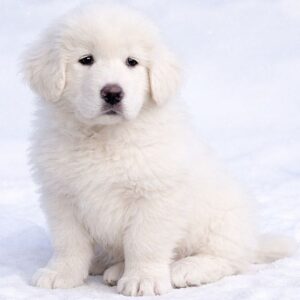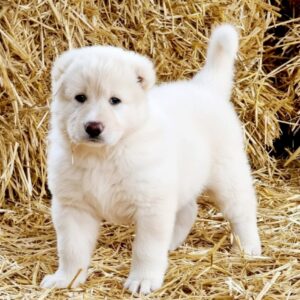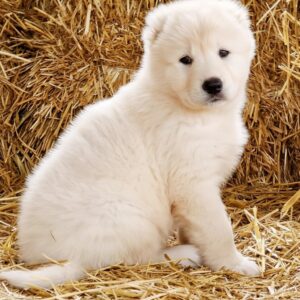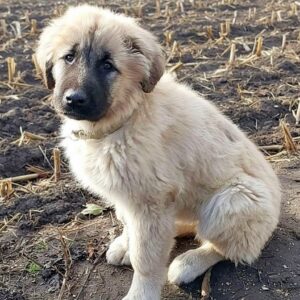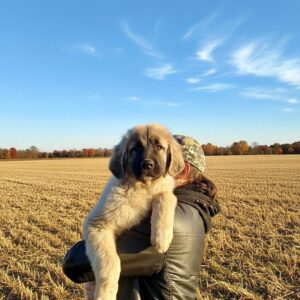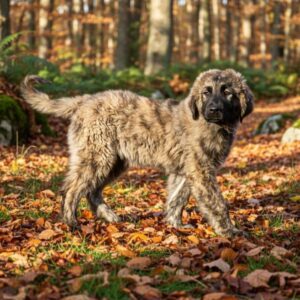
Caucasian Mountain Dog
These enormous dogs have a fuzzy coat designed to resist the harsh climate of the Caucasus: they even have fur between their toes. The Caucasian Mountain Dog is bright and brave, but can be headstrong. Poor training and inadequate socialisation can make this dog aggressive and unmanageable. This breed is best suited to an experienced owner that is willing to provide proper exercise and training – and doesn’t mind heavy shedding twice a year!
Caucasian Mountain Dog breed attributes
About Caucasian Mountain Dog breed
Description
Also called the Caucasian Shepherd Dog, this breed is big. The Caucasian Mountain Dog has a large, strong frame, with well-developed muscles. Dogs of the Plains Type have a lighter build, whereas Mountain type dogs are more muscular. Both types grow up to be enormous adults, both in height and weight.
The Caucasian Mountain Dog has large deep-set eyes, and strong straight legs that end with massive hairy paws. The tail is curly, and the hips are slightly raised in comparison with the rest of the body.
Origin: North Caucasus, Armenia, Georgia, Azerbaijan
Look
This breed is very furry, with a dense, feathery, weather-resistant coat. The thick hair covers the Caucasian Mountain Dog: even the toes are hairy. Puppies start out with a finer coat, but gradually grow into the thicker adult coat. This breed sheds heavily twice a year. Between its biannual heavy shedding, the Caucasian Mountain Dog sheds smaller amounts of fur every so often, so frequent brushing is a must. The Caucasian Mountain Dog comes in a variety of colours, including white, pied, brindle, rust, fawn, tan, grey, and black mask markings (the FCI does not accept brown dogs).
Health
While the Caucasian Mountain Dog is generally a healthy dog, they are prone to a few health conditions:
• Hip dysplasia
• Elbow dysplasia
• Cancer
• Heart problems
• Obesity
At Newdoggy.com we promote reputable breeders, who use genetic testing and good breeding practices to remove genetic conditions from their breeding lines. Newdoggy.com’s Health Guarantee certifies that all promoted puppies are in good health.
Learning
The Caucasian Mountain Dog is very intelligent and brave, but can be wilful and headstrong. Poor training and inadequate socialisation can make this dog aggressive and unmanageable. Training and socialisation need to start as early as possible to avoid unwanted behaviours later on in life. Good handling and training throughout your dog’s life are likely to be necessary.
The Caucasian Mountain Dog needs a firm and patient trainer. They are independent thinkers and slow to mature, so training can be challenging. They respond well to positive training methods, but you need to be consistent. The Caucasian Mountain Dog is not recommended for first time dog owners due to these traits.
Temperament
The Caucasian Mountain Dog is brave and fiercely protective of its family and friends. Unfortunately this means that the breed is disinterested in strangers, and at worst actively hostile to them. Early training and socialisation will help you to teach your Caucasian Mountain Dog good manners; however, you will need to be consistent in your handling. This breed is often headstrong and may assume that he/she is top dog (literally) unless you make it clear that he/she isn’t.
Living with
This breed is best suited for an experienced dog owner who can bring out its best traits. This is not a dog for apartment life or couch potatoes. The Caucasian Mountain Dog is energetic, and needs rigorous exercise every day.
They are very protective dogs, and often rush at and knock over intruders or perceived threats. This breed has the potential to be a dangerous dog, so you need to be a highly conscientious dog owner. Keep your Caucasian Mountain Dog in a fenced garden or yard, and never let them run loose. The fence should be sturdy and high enough that your dog cannot jump over it. It is debated whether this breed is suitable for families with children: on the one hand, they are highly affectionate and gentle to family members (even to other family pets), but their size means they can be rough during play. This dog should not be left unsupervised with children, as it may perceive rough play as a threat to its family members.
If you are willing to put in the time and effort need to keep this breed, you may find owning a Caucasian Mountain Dog very rewarding. These dogs are very affectionate towards their family, and make excellent guard dogs.
Find Caucasian Mountain Dog Puppies for Sale
New litter alert
Please fill in the below form and we will let you know when a new Caucasian Mountain Dog litter arrives.

